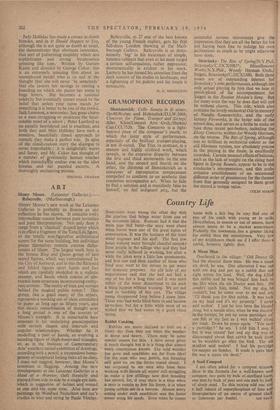GRAMOPHONE RECORDS
Shostakovich: Cello Sonata in D minor, Op.40/Brabec and Holetschek/D.LW.5068; Concerto for Piano, Trumpet and Strings/ Alter, Klein/Concert Arts Orch./Slatkin/ Cap.CCL7520. The Concerto is a light- hearted piece of the composer's youth, to which the jazzy style of performance, especially of the brilliant trumpet-playing, is not ill-suited. The Trio, in contrast, is a mature and highly civilised work, which reveals, in the excessive disparity between the first and third movements on the one hand, and the second and fourth on the other, the dilemma of Shostakovich as a composer of introspective temperament compelled to conform to an aesthetic that condemns introspective art. When he fails to find a solution and is manifestly false to himself, we feel indignant pity, but the
successful serious movements give the impression that they are all the better for his not having been free to indulge his own inclinations as much as he might otherwise have done.
Stravinsky: The Rite of SpringIN.Y .Phil.
Stravinsky/C.33CX1083*•' Miscellaneous Works/N.Y.Phil. Woody Herman Oral./ Szigeti, StravinsiCy/C.33CX1100. Both these issues are of outstanding interest for Stravinsky 's own performances, although the only actual playing by him that we hear is plonk-plonk of the accompaniment for Szigeti in the Russian Maiden's Song. But for many even the way he does that will not be without charm. This side, which also contains the lovely orchestral Ode in memory of Natalie Koussevitzky, and the early fantasy Fireworks, is the better side of the mixed disc, and serves as a bribe to make us take three recent pot-boilers, including the Ebony Concerto, written for Woody Herman, on the reverse. The Rite of Spring, although not so brilliant in orchestral colour as the old Monteux version, nor absolutely precise in the playing in the finale. is excellently recorded. Certain unusual effects of balance, such as the lack of weight on the rising bass figure in Spring Rounds, appear to be in the conductor's interpretation, and this auth- oritative establishment of an occasional different order of prominence for the themes from that generally assigned to them gives the record a unique value. -
COLIN MASON


































 Previous page
Previous page